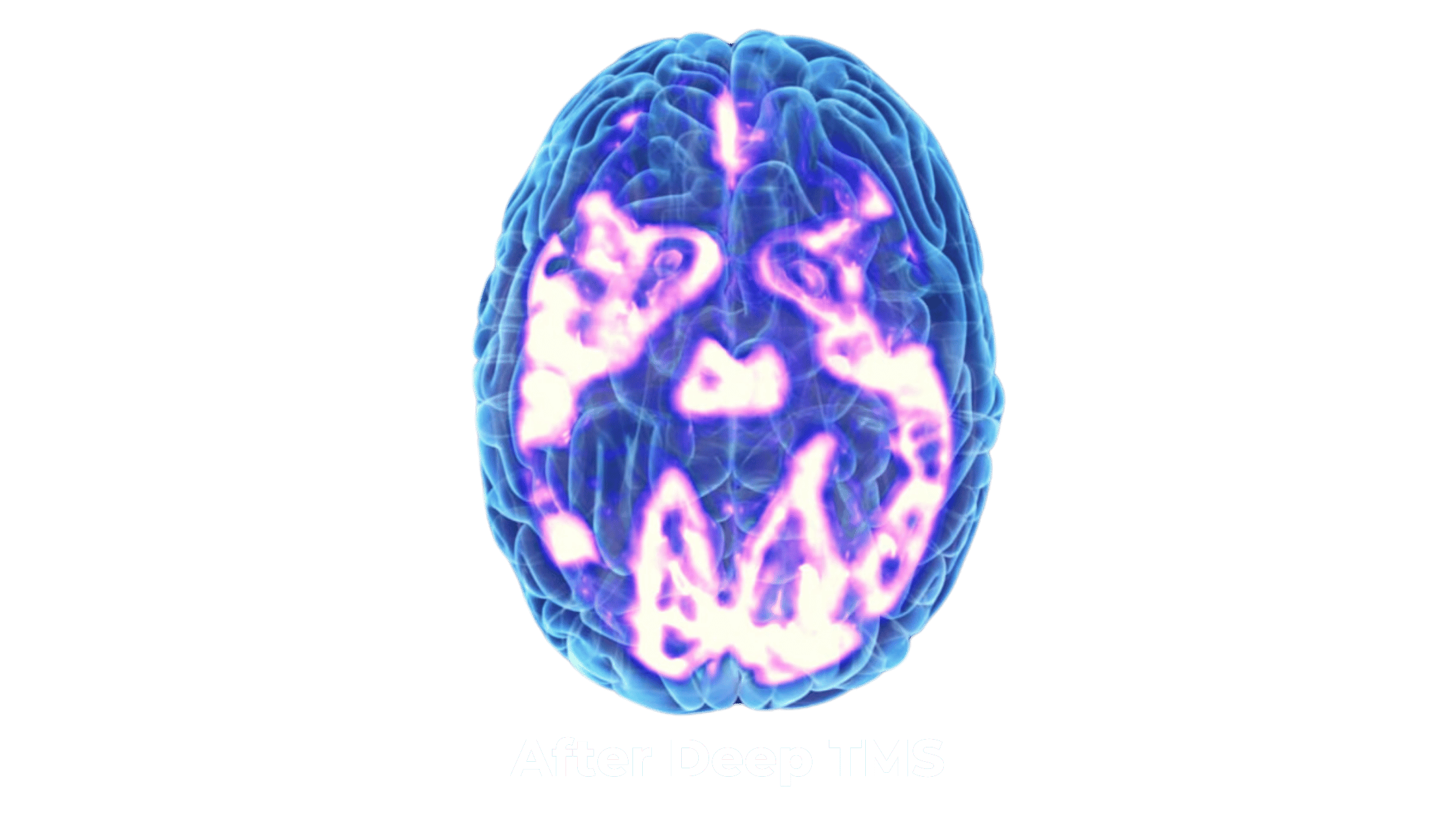TMS Therapy for Anxiety
A non-invasive, FDA-approved treatment that calms brain areas linked to anxiety. Get Started
Why Choose TMS Therapy to Treat Anxiety?
Experience a safe, clinically proven treatment designed for your unique needs
If you’re struggling with anxious depression that won’t relent, ReNu Brain Treatment Center offers a breakthrough option: Deep Transcranial Magnetic Stimulation (dTMS) therapy. With unparalleled effectiveness and a non-invasive, drug-free approach, dTMS provides hope for those who haven’t found relief with traditional treatments.
Non-Invasive and Drug-Free
No medications or surgery required. TMS is a comfy and drug-free treatment option
Minimal to No Side Effects
Unlike traditional antidepressants, most patients experience little to no adverse effects.
High Success Rates
Over 75% of our clients report significant improvements in their mood within just 10 days of treatment.
No Downtime
Resume your daily activities immediately after your session.
Personalized Care
Treatment plans tailored to your specific symptoms and goals.
How Effective is TMS for Anxiety?
Studies show that Transcranial Magnetic Stimulation (TMS) significantly reduces anxiety symptoms. The efficacy of TMS in treating anxiety disorders has been well-documented in numerous studies.
A meta-analysis published in the Journal of Psychiatric Research found TMS to be much more effective than other treatments, providing real, measurable relief for many patients.
Clinical Outcomes and Efficacy
TMS has helped 50-60% of patients see real improvements in their anxiety. For some, the results are life-changing, with their symptoms disappearing completely. This means they can achieve full remission, allowing them to live more freely and enjoy everyday life without the constant burden of anxiety.

TMS vs. Alternative Treatments
While TMS is not a replacement, it is a valuable addition to comprehensive care. Unlike traditional and alternative methods, TMS focuses directly on the brain areas linked to anxiety, making it more precise and effective.
TMS
- Non-invasive, with few side effects.
- Targets barin areas linked to anxiety.
- Works well with medication or therapy.
Alternative Treatments
- Often involves medication with more side effects.
- Affects the whole body, not just specific areas.
- May require combining multiple medications.
The great thing about TMS is that it’s non-invasive, medication-free, and has fewer side effects. When combined with other therapies, TMS can help people get even better results, making it an important part of their recovery.

How Is Anxious Depression Treated with TMS?
Anxious Depression are treated using the same Deep TMS technology. However, treating anxious depression may involve specific protocols or adjustments tailored to address the unique anxiety component. This ensures a comprehensive approach to therapy.
Whether you’re struggling with MDD, anxious depression, or another subtype, our team at ReNu Brain Treatment Center tailors the TMS treatment to your unique needs for optimal results.
What is TMS and How Does It Alleviate Depression?
Transcranial Magnetic Stimulation (TMS) is a non-invasive, FDA-approved treatment that offers renewed hope for individuals battling depression, OCD, and anxiety.
Clinically proven and recognized as both safe and highly effective, TMS therapy uses magnetic pulses to stimulate the electrical components of the nervous system. ReNu’s Deep TMS has a success rate above 80%, helping patients regain control over their emotional well-being and improving their overall quality of life.
Why Deep TMS (dTMS) is Superior to Traditional TMS (rTMS)
- Deeper reach: dTMS stimulates broader, deeper brain regions, including the limbic system, which plays a crucial role in mood regulation.
- Enhanced efficacy: Proven to create lasting neural pathways for better emotional balance.
- Comprehensive treatment: Targets areas inaccessible to rTMS, making it a better choice for treatment-resistant depression.
- Proven Effectiveness: Over 75% of clients experience significant symptom relief, with many noticing improvements within just 10 days of treatment.
TMS Safety and Tolerance
TMS is considered a safe and low-risk treatment. Most people have little to no side effects, making it a comfortable option for managing anxiety. Still, it’s a good idea to talk with your healthcare provider about any potential risks and benefits to see if TMS is a good fit for you.
The TMS Treatment Process for Anxiety
1. Initial Assessment
Before starting TMS therapy for anxiety, patients undergo an evaluation. Doctors evaluate common anxiety issues like constant worrying, muscle tension, or panic attacks. They review the type and severity of your anxiety and consider what treatments you’ve already tried, such as therapy or medications. They also check other health conditions to create a treatment plan that fits your needs.
2. What to Expect During a TMS Session
TMS sessions for anxiety target brain areas that control stress and fear, like the prefrontal cortex. You sit comfortably in a chair, fully awake and relaxed. A TMS coil rests on your head and sends gentle magnetic pulses to your brain. These pulses feel like light tapping. Sessions are straightforward and last about 20 to 40 minutes.
3. How Long Does TMS Take?
TMS for anxiety typically involves daily sessions, five days a week, for 4 to 6 weeks. Most people complete about 20 to 30 sessions in total, but the number may vary based on how well your anxiety responds. Adjustments to the treatment may focus on reducing stress and improving mental clarity over time.
4. Potential Side Effects
TMS is typically well-tolerated, with only mild side effects, such as:
- A slight headache or scalp discomfort during or after the session.
- Lightheadedness
- Small facial muscle twitches
- Tingling sensations.
These side effects usually go away quickly. Serious side effects are rare, but it’s important to discuss any concerns with your doctor to ensure TMS is safe for you.
Your Journey with TMS Therapy
1
Initial
Consult
A thorough evaluation to ensure you’re a candidate for TMS therapy.
2
Personal Treatment Plan
Customized sessions based on your unique brain activity.
3
Comfy Therapy Sessions
Each session lasts about 20 minutes, in a relaxed, supportive environment.
4
Ongoing Support
Our team monitors your progress and makes adjustments to maximize results.
“Real People, Real Results”
Before TMS, I had tried varying combinations of medications and therapy. Nothing seemed to help with my depression. I was mad, sad, irritable, anxious, had an inconsistent sleep schedule, and was constantly overwhelmed. Life felt empty.The ReNu Brain Treatment Center accommodated my work schedule and the treatment was effortless.I cannot thank everyone at ReNu enough for giving me a new outlook on life!
Before going to the ReNu Brain Treatment Center I had severe depression. The people (staff) at ReNu TMS, have help me tremendously. I recommend it to anyone with depression.
Frequently Asked Questions
What are Anxiety and Anxiety Disorders?
Anxiety is a natural response to stress, but anxiety disorders involve intense and excessive fear or worry that disrupt daily life. These disorders include conditions like generalized anxiety disorder, social anxiety, and panic disorder.
What are the Symptoms of Anxiety?
Symptoms of anxiety can include restlessness, fatigue, trouble concentrating, and physical symptoms like a rapid heartbeat, sweating, or muscle tension. Emotional signs often include excessive worry or feelings of dread.
What are the Treatment Options Available for Anxiety?
Treatment options include therapy, medications, lifestyle changes, and non-invasive methods like TMS. Each treatment plan should be tailored to the individual’s needs and the severity of their anxiety.
How does TMS help in the Treatment of Anxiety?
TMS targets specific areas of the brain linked to anxiety, like the prefrontal cortex, using gentle magnetic pulses. This stimulation helps regulate brain activity, reducing symptoms of anxiety over time.
What Should I Expect During TMS Therapy?
During TMS therapy, you sit comfortably while a magnetic coil delivers painless pulses to targeted brain areas. Sessions typically last 20 to 40 minutes and require no downtime, so you can resume your day immediately after.
What Are the Advantages of TMS?
TMS is non-invasive, medication-free, and has minimal side effects. It’s also effective for people who haven’t responded well to other treatments.
Who Can Benefit From TMS?
TMS is ideal for adults with anxiety disorders who have not found relief from traditional therapies. It’s also a good option for those seeking a non-invasive treatment alternative.
